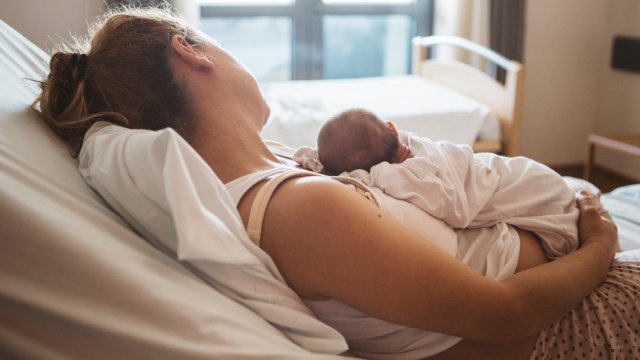
Before I gave birth I had heard horror stories about the stay in hospital after birth. Cruel midwives, dismissive nurses, uninterested doctors. Mess ups, mix-ups, confusion. That sort of thing. But I knew that it was going to be different for me because I don’t let people treat me like that. I’m direct, empowered, I take no nonsense. I literally wrote a book called The Power of Rude: A Woman’s Guide to Asserting Herself.
Only – and I’m sure you know where this is going – it wasn’t different for me. It wasn’t different at all. Over the weekend I read this piece on MailOnline, where three women discuss the specific ways that the NHS failed them during and after they gave birth.
I shed a tear for these women, only one of whom I know personally, because their experiences were so utterly cruel, and because they reminded me so clearly of my own.
I had an elective C-section because it has the highest survival rate for both the mother and the baby, and because my daughter was breech for most of the pregnancy. I liked the sense of control that comes with it, and as I would refuse any intervention such as forceps in favour of a C-section in a difficult delivery, it seemed the most sensible choice.
Because my C-section was elective I had to arrive at the hospital at 7am and then sit in the waiting room until they had time to do it. It took place at 5pm.
I hadn’t been permitted to eat since the night before, and was only allowed to drink small sips of water. When you’re nine months pregnant, that’s not really much fun, but obviously no one explained this to me, let alone apologised.
When, after six hours of waiting, I tentatively asked when I’d be seen, the man on reception just shrugged.
The C-section was fine. Uncomplicated. At least I think it was; no one ever debriefed me about it. At one point afterwards someone told me I’d lost a surprising amount of blood but there was never any explanation about that.
I was wheeled into recovery, where I stayed for two or three hours, and then I was told that I’d be going up to the ward. My then husband was sent home, and I found myself entirely alone, surrounded by a curtain, still mostly numb from the waist down, with a tiny baby next to me in a plastic box.
I was starving, but apparently I’d missed meal times. I’d heard people talk about nurses making you a cup of tea and a piece of toast but that sure as shit wasn’t happening here. A healthcare assistant told me that if I wanted food I needed to order Uber Eats and then get someone to go and pick it up. I couldn’t move my legs and I’d just had major abdominal surgery, and they’d sent my partner home.
Eventually I begged someone to go downstairs and meet the increasingly stressed delivery driver. The nurse rolled her eyes and then sent someone. I was embarrassed but I’d also given birth and desperately needed to eat something.
That was the last time I saw anyone for hours, until the middle of the night when I begged for morphine. I was given it once, and then told I’d be getting ibuprofen and paracetamol but nothing else. I, the woman who wrote the book on saying “fuck it” to seeming rude, didn’t utter a word of complaint about any of it.
After you’ve just had a C-section, where they cut through your skin, fat, facia, muscle and uterus, you’re not really up for a lot of bending and stretching. In fact you literally can’t twist to pick up your baby. When she cried I rang the call button so they could pass me the baby. Every time they came to help they rolled their eyes at me, and eventually (still the same night I gave birth) one nurse told me to just leave her to cry.
The only people who did seem to want to provide attention was the constant stream of breastfeeding experts. I saw four lactation specialists while I was in hospital for 48 hours. One told me off for having already used formula; I said nothing. Another told me I was lying about not producing colostrum (pre breastmilk known as liquid gold). She then palpated my arid tit for 10 minutes and then left, expressing her horror that I was madly rare not to have made any at all. Another saw a dummy in the corner of my cubicle. “What is that?” she asked, like it was a crack pipe. I told her it was a dummy, which she clearly knew. “The nipple is nature’s dummy,” she told me. When I countered that the American Association of Pediatrics suggests dummy usage reduces sudden infant death syndrome (SIDS), she told me, “breastfeeding is what reduces SIDS risk”.
I didn’t tell her to get lost, nor did I point out that this was a very cruel thing to tell a new mother who was sobbing over not producing breastmilk.
When my daughter was six weeks old I ended up back in the same hospital with pancreatitis, from gallstones, which is a fairly common result of pregnancy. My skin had started to go yellow and I was intermittently having to lie on the floor, writhing in pain, trying to feed my newborn while throwing up (I was single parenting, so this really wasn’t great timing). Anyway, I went into hospital again. And this time it was day and night. Obviously being in hospital is always a bit of a miserable experience, but the staff were kind. Meal times were observed. There were people to help me get a glass of water, and I was allowed visitors. The disparity between the care I received during this period of time, and after I gave birth, was astonishing.
I don’t know what causes this strange culture where maternity care, especially post partum, is so much worse than any other kind of care. Perhaps it’s because after you’ve given birth you’re not technically ill. Or maybe it’s because becoming a mother is a privilege. But whatever the reason, we live in a world where bleeding women are left alone in pain without a drink, without the right pain medication, without anyone to reassure them that they’re going to be okay. And that just can’t be allowed to continue.
Initially I didn’t talk about any of this because I, like most people in the UK, love the NHS, and criticising it is a kind of blasphemy. I’m very aware that when articles are published about maternity failures, both in terms of hurting women and babies not surviving birth, it can be used as a backdoor to privatisation.
But we can’t expect women to stay silent about the pain and trauma created by a maternity system which isn’t fit for purpose, in case speaking openly is engineered to damage the universal healthcare system.


